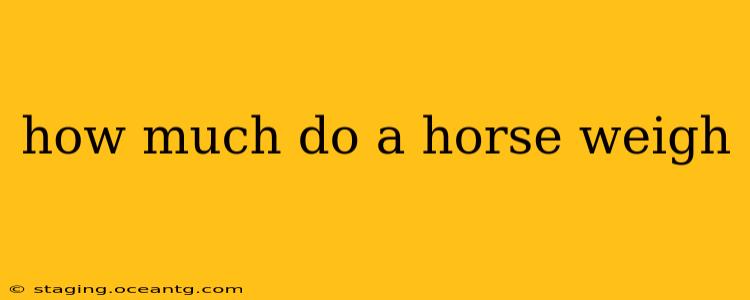How Much Does a Horse Weigh? A Comprehensive Guide
The weight of a horse is highly variable, depending on several factors. There's no single answer to "how much does a horse weigh?" It's like asking how much a dog weighs – the answer depends on the breed, age, sex, and overall health and condition of the animal. Let's delve into the specifics to give you a clearer picture.
What are the average weights of different horse breeds?
Horse breeds exhibit significant size variations. Ponies, for instance, are considerably smaller and lighter than draft horses. Here's a general overview, keeping in mind that these are averages and individual horses can vary significantly:
- Ponies: Generally range from 300 to 900 pounds. Shetland ponies, for example, are on the smaller end of this spectrum.
- Light Horses: This category includes breeds like Thoroughbreds, Quarter Horses, and Arabians. They typically weigh between 800 and 1200 pounds.
- Draft Horses: These are the heavyweights of the equine world, including breeds like Clydesdales and Percherons. They can easily reach 1800 pounds or more, with some exceeding 2000 pounds.
How does age affect a horse's weight?
A horse's weight changes dramatically throughout its life. Foals (baby horses) are naturally much lighter, gradually increasing in weight as they mature. Older horses may experience weight loss due to age-related health issues or decreased activity levels. Therefore, age is a crucial factor in determining a horse's weight.
Does a horse's sex impact its weight?
Generally, male horses (stallions) tend to be larger and heavier than female horses (mares) of the same breed and age. This difference isn't always significant, but it's often noticeable. Geldings (castrated males) typically fall somewhere in between stallions and mares in terms of weight.
How can I accurately determine a horse's weight?
Accurate weight measurement is important for veterinary care, feeding management, and overall health monitoring. Several methods exist:
- Scales: Dedicated horse scales are the most accurate method. These are often found at veterinary clinics or larger equestrian facilities.
- Weight Tapes: These are measuring tapes calibrated to estimate weight based on the horse's heart girth (circumference around the chest, just behind the elbows). They provide a reasonable approximation but aren't as precise as scales.
- Weight Estimation Formulae: Various formulas exist that use heart girth and body length measurements to calculate approximate weight. These formulas can be useful if scales or weight tapes aren't available but have inherent inaccuracies.
What is considered overweight or underweight in a horse?
A veterinarian can best determine if a horse is at a healthy weight. They will assess the horse's body condition score (BCS), considering factors like muscle mass, fat deposits, and bone structure. An unhealthy weight, whether overweight or underweight, can negatively impact the horse's health and well-being.
How does diet and exercise affect a horse's weight?
A horse's diet plays a crucial role in its weight. An unbalanced diet, excessive feeding, or inadequate nutrition can lead to either weight gain or weight loss. Regular exercise is also vital in maintaining a healthy weight and overall fitness.
In conclusion, there's no single answer to "how much does a horse weigh?". The weight depends significantly on breed, age, sex, diet, and overall health. Accurate weight determination requires professional assessment or the use of proper measuring tools. Remember, maintaining a healthy weight is essential for a horse's well-being.
